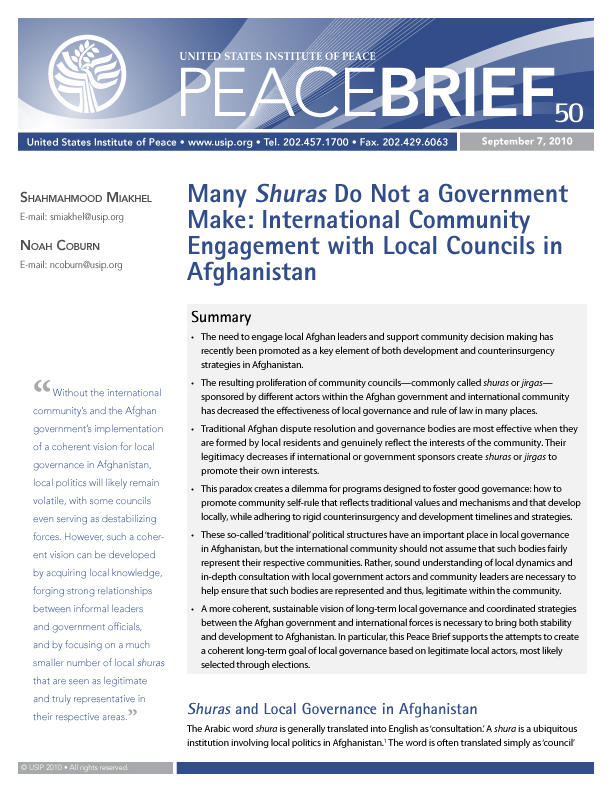Many Shuras Do Not a Government Make: International Community Engagement with Local Councils in Afghanistan
The need to engage local Afghan leaders and support community decision making has recently been promoted as a key element of both development and counterinsurgency strategies in Afghanistan. This Peace Brief supports the attempts to create a coherent long-term goal of local governance based on legitimate local actors, most likely selected through elections.

Summary
- The need to engage local Afghan leaders and support community decision making has recently been promoted as a key element of both development and counterinsurgency strategies in Afghanistan.
- The resulting proliferation of community councils—commonly called shuras or jirgas— sponsored by different actors within the Afghan government and international community has decreased the effectiveness of local governance and rule of law in many places.
- Traditional Afghan dispute resolution and governance bodies are most effective when they are formed by local residents and genuinely reflect the interests of the community. Their legitimacy decreases if international or government sponsors create shuras or jirgas to promote their own interests.
- This paradox creates a dilemma for programs designed to foster good governance: how to promote community self-rule that reflects traditional values and mechanisms and that develop locally, while adhering to rigid counterinsurgency and development timelines and strategies.
- These so-called ‘traditional’ political structures have an important place in local governance in Afghanistan, but the international community should not assume that such bodies fairly represent their respective communities. Rather, sound understanding of local dynamics and in-depth consultation with local government actors and community leaders are necessary to help ensure that such bodies are represented and thus, legitimate within the community.
- A more coherent, sustainable vision of long-term local governance and coordinated strategies between the Afghan government and international forces is necessary to bring both stability and development to Afghanistan. In particular, this Peace Brief supports the attempts to create a coherent long-term goal of local governance based on legitimate local actors, most likely selected through elections.
About this Brief
The authors work in the Kabul office of the United States Institute of Peace on local governance and rule of law projects that help communities resolve conflict, increase access to justice and promote rule of law. Shahmahmood Miakhel is USIP’s country director in Afghanistan. From 2003 to 2005, he was Afghanistan’s deputy minister of the interior. Additionally, he has worked for the United Nations Assistance Mission in Afghanistan, the U.N. Development Program and the U.N. Office for Project Service. Noah Coburn is a political anthropologist focusing on informal justice at USIP’s office in Kabul. He has been conducting research on violence and local political structures in Afghanistan since 2005. This report is based upon observations by the two authors, field visits to the south, east, southeast, west and center of the country, as well as discussions with hundreds of local government officials, local leaders and members of the international community.



